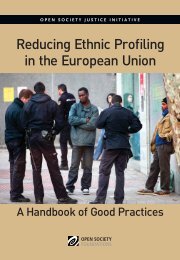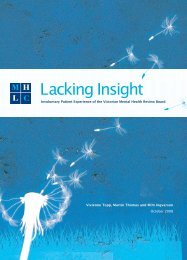individual communication to the united nations ... - Community Law
individual communication to the united nations ... - Community Law
individual communication to the united nations ... - Community Law
You also want an ePaper? Increase the reach of your titles
YUMPU automatically turns print PDFs into web optimized ePapers that Google loves.
4Part 11.1 SummaryThe Author, her husband and children were unlawfully evicted from <strong>the</strong>ir home on NicholsRoad Stradbroke in Gippsland, Vic<strong>to</strong>ria, Australia on 9 January 2000. 2 The police failed <strong>to</strong>protect <strong>the</strong> Author or her family from <strong>the</strong> unlawful eviction and <strong>the</strong>y failed <strong>to</strong> prosecute <strong>the</strong>landlord for such eviction. The Author made a complaint <strong>to</strong> <strong>the</strong> Ombudsman about <strong>the</strong> policefailures. According <strong>to</strong> <strong>the</strong> police investigation in<strong>to</strong> her complaint, <strong>the</strong> police failed <strong>to</strong> prevent<strong>the</strong> eviction because <strong>the</strong> police regard unlawful evictions as “civil” ra<strong>the</strong>r than criminal. 3This investigation and its conclusions were supported by <strong>the</strong> Police Ombudsman 4 and later by<strong>the</strong> Office of Police Integrity which stated “everything that can be done has been done”. 5An appeal by <strong>the</strong> Author <strong>to</strong> <strong>the</strong> Supreme Court of Vic<strong>to</strong>ria was struck out with costs awardedagainst her. 6 The Supreme Court confirmed that citizens have no power <strong>to</strong> compel police <strong>to</strong>act, but that <strong>the</strong>ir superiors could. 7 Having made every conceivable complaint <strong>to</strong> Vic<strong>to</strong>ria'spolice accountability bodies, <strong>the</strong> Minister for Police 8 and <strong>the</strong> Queen 9 , without success, it is<strong>the</strong> Author's submission that no fur<strong>the</strong>r complaint avenues exist. Fur<strong>the</strong>rmore, she contendsthat any legal appeal avenues by <strong>the</strong> Author <strong>to</strong> ensure police protection of her rights underArticle 17 are manifestly futile and have no prospects of success.The failure of <strong>the</strong> police <strong>to</strong> protect <strong>the</strong> Author and her family rendered <strong>the</strong> family homelessand contributed <strong>to</strong> years of distress. Without statu<strong>to</strong>ry criminal protections that criminaliseunlawful evictions, and <strong>the</strong> private right of citizens <strong>to</strong> seek compensation when <strong>the</strong> policefail <strong>to</strong> act on such serious rights breaches, <strong>the</strong> State of Vic<strong>to</strong>ria fails <strong>to</strong> protect families frombreaches of Article 17 of <strong>the</strong> ICCPR.2 See attachment marked “U”.3 See attachment marked “DD”.4 See attachment marked “FF”.5 See attachment marked “GG”.6 See attachment marked “NN” at page 25, line 29, 30, 31.7 See attachment marked “NN” at page 4, line 26-29.8 See attachment marked “LL”.9 See attachment dated 23 June 2005 and marked “MM”.Ashling Gandy v Australia, Individual Communication <strong>to</strong> <strong>the</strong> Human Rights Committee
















